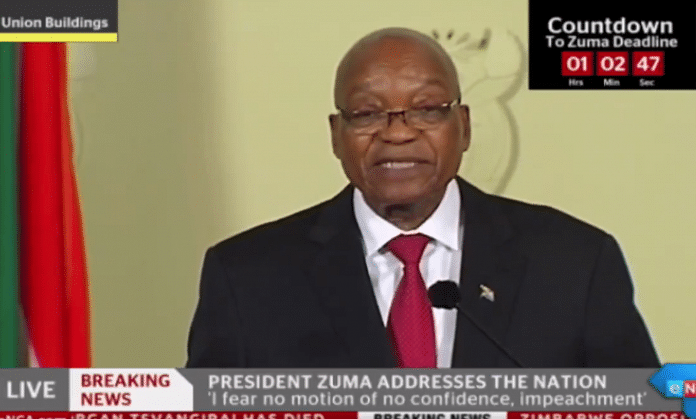Exeunt Jacob Zuma
After mounting pressure from the African National Congress, Jacob Zuma has finally resigned as President of South Africa on Wednesday evening. Zuma has been reluctant to let go of power, despite being implicated in several corruption scandals. The ANC almost forced his hand, electing another leader to replace him and giving him a deadline to leave office.
“That done, the question now is whether the A.N.C., the party of Nelson Mandela, which has had a near-monopoly on South African politics since the end of minority rule, can cleanse and revive itself under Cyril Ramaphosa, its new leader, who is now all but certain of being elected the nation’s president by Parliament,” editorializes the New York Times. “Once Parliament chooses the president in South Africa and the A.N.C. controls Parliament, the expectation was that Mr. Zuma would step down. But he refused, until the party this week threatened a vote of no confidence to force him out.”
The New York Times reminds us that there is nothing to regret in Zuma’s fall. “Though he spent time in prison with Mr. Mandela and in exile, on coming to power he succumbed to the sordid lure of power’s perks and now faces multiple accusations of corruption and other unethical behavior. He also came to be identified with a nation economically adrift and unable to achieve the economic equality promised at the end of white rule. But the A.N.C. continued to prop up Mr. Zuma, at least until the party itself began losing its once unassailable popularity and Mr. Zuma became a liability ahead of national elections in 2019.”
Ramaphosa has an uphill battle to fight, as “too many years of unchallenged power have nurtured lethargy and a culture of corruption.” Hopefully he can prove to be a welcome replacement to Zuma.
China’s ‘Belt and Road’ is running into roadbloacks
“An idea as big as China’s “Belt and Road” is bound to have contradictions,” writes Jonathan E. Hillman in the Washington Post. “But there is a fundamental tension between the connectivity China says it seeks and the control it is unwilling to give up. Even as China claims to be championing globalization and broadening ties, it is clamping down in critical borderlands that Belt and Road routes would pass through, potentially crippling its own projects.”
Hillman goes on to detail the various parts of the project that are working, but most aren’t. “This fundamental tension — between maintaining control and promoting connectivity — extends into the Belt and Road’s very core,” Hillman writes. “The initiative aims to fuel trade, but Beijing’s security measures constrain commerce.”
“Despite its contradictions, China’s Belt and Road remains the most ambitious economic vision on the global stage and its points of coherence, particularly exporting Chinese overcapacity to countries with considerable development needs, are powerful. But what China’s vision ultimately looks like on the ground will depend on its willingness to trade control for connectivity,” he writes.
Imbalance in the Middle East
Iran is playing a risky game in Syria by trying to control Israel’s actions in the war-torn country, argue Amos Yadlin and Ari Heistein in Foreign Policy. “Last weekend’s clashes on Israel’s northern border occurred within this context. An Iranian drone breached Israeli airspace, Israel retaliated by bombing multiple targets deep in Syrian territory, and Syria then shot down an Israeli fighter jet,” they summarize.
“By launching a sophisticated unmanned aerial vehicle into Israeli airspace on Saturday, Iran set off a chain reaction, which led the Israeli Air Force to strike Iranian and Assad regime positions in Syria, including the Iranian command center from which the drone was being remotely piloted. This gave the Assad regime an opportunity to set a new precedent by firing on Israeli jets over Israeli territory, downing an Israeli F-16, and provoking further Israeli Air Force strikes on Syrian targets.”
“In its far-reaching retaliatory raid on a dozen Syrian and Iranian targets, Israel sought to make clear there would be a cost if Assad and his Iranian allies challenged the “rules” again in the near future. By causing heavy damage to Syrian defense infrastructure but not going “all the way” and completely decimating all air defense units, Israel is well positioned to deter future incursions into its airspace. It demonstrated that it could demolish all Syrian forces if necessary to establish complete air superiority, but by not doing so gave Damascus an incentive to avoid future conflict.”
Given that the Syrian government is currently almost non-existent, Assad is probably more interested in rebuilding his country than on retaliating to Israeli and Iranian provocations. Hezbollah, Yadlin and Heistein write, might be arming itself but isn’t interested in getting into another conflict with Israel that could spread to Lebanon. Lastly, Iran’s own issues—especially the people’s protests against the government—show that the country should probably stay away from increasing involvement in Syria.



